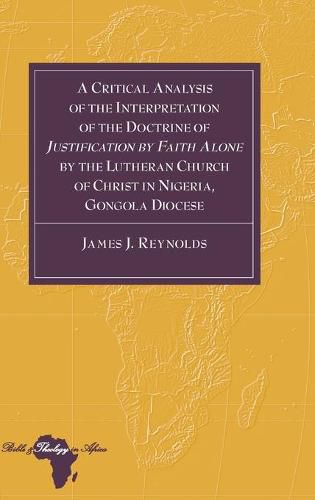Readings Newsletter
Become a Readings Member to make your shopping experience even easier.
Sign in or sign up for free!
You’re not far away from qualifying for FREE standard shipping within Australia
You’ve qualified for FREE standard shipping within Australia
The cart is loading…






This title is printed to order. This book may have been self-published. If so, we cannot guarantee the quality of the content. In the main most books will have gone through the editing process however some may not. We therefore suggest that you be aware of this before ordering this book. If in doubt check either the author or publisher’s details as we are unable to accept any returns unless they are faulty. Please contact us if you have any questions.
Within the context of the Lutheran Church in Nigeria, Gongola Diocese, this book examines the issues of the interpretation, transmission, and appropriation of the doctrine of justification by faith alone. Using contextualization as the main tool in this exploration, James J. Reynolds argues that intercultural communication holds the key to unlocking how effectively and appropriately these three engagements with theology are executed. The Lutheran church, and indeed most Protestant denominations, assert that justification by faith alone is the cardinal doctrine of Christianity. Scholars, however, are concerned that there is a great level of ignorance among members and misappropriation of justification by faith alone in the lives of members of these denominations. To investigate these underlying factors, three theories are used as a framework with which to test the church’s interpretation of this doctrine: gospel and culture in dialogue, translatability, and contextual theological education programmes for the training of both clergy and laity. In order to initiate this process, the gospel and culture must engage in dialogue through a viable and contextual theological education programme for the training of both clergy and the laity. The Lunguda practice of ntsandah provides an ideal entry point for a proper informed interpretation of justification by faith alone. Ultimately, the author argues that the employment of intercultural communication in transmitting the message of justification by faith alone will be successful in helping address this problem.
$9.00 standard shipping within Australia
FREE standard shipping within Australia for orders over $100.00
Express & International shipping calculated at checkout
This title is printed to order. This book may have been self-published. If so, we cannot guarantee the quality of the content. In the main most books will have gone through the editing process however some may not. We therefore suggest that you be aware of this before ordering this book. If in doubt check either the author or publisher’s details as we are unable to accept any returns unless they are faulty. Please contact us if you have any questions.
Within the context of the Lutheran Church in Nigeria, Gongola Diocese, this book examines the issues of the interpretation, transmission, and appropriation of the doctrine of justification by faith alone. Using contextualization as the main tool in this exploration, James J. Reynolds argues that intercultural communication holds the key to unlocking how effectively and appropriately these three engagements with theology are executed. The Lutheran church, and indeed most Protestant denominations, assert that justification by faith alone is the cardinal doctrine of Christianity. Scholars, however, are concerned that there is a great level of ignorance among members and misappropriation of justification by faith alone in the lives of members of these denominations. To investigate these underlying factors, three theories are used as a framework with which to test the church’s interpretation of this doctrine: gospel and culture in dialogue, translatability, and contextual theological education programmes for the training of both clergy and laity. In order to initiate this process, the gospel and culture must engage in dialogue through a viable and contextual theological education programme for the training of both clergy and the laity. The Lunguda practice of ntsandah provides an ideal entry point for a proper informed interpretation of justification by faith alone. Ultimately, the author argues that the employment of intercultural communication in transmitting the message of justification by faith alone will be successful in helping address this problem.